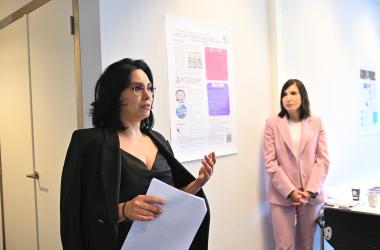Infusing the Socratic Method into Business Education: A Case Study by Wittenborg

What Can We Learn from Socrates? Wittenborg Researchers Investigate
What can we learn from the Socratic Method? This question sparked a thought-provoking discussion at Wittenborg's recent Globalisation Conference. A poster presentation showcased a compelling case study by Wittenborg's Fjorentina Muco, Hanna Abdelwahab and Vanessa de Oliveira Menezes, which explored the integration of this ancient teaching technique into higher education. Their research focused on enhancing student engagement and critical thinking in the module 'Intercultural Business Communication for Managers'.
The Socratic Method, rooted in the teachings of the ancient philosopher Socrates, encourages a dialogue-driven approach to learning, where questioning takes centre stage. As Muco noted, “This is related to the education and methodology through which the business school teaches an international group of students.”
She emphasised that the aim is not merely to transmit knowledge but to foster an inquiry-based mindset that students can use throughout their lives: “A business school should be more than just transmitting the already established knowledge from experts and academics. It should also provide methods through which students can apply in the future practical world when they will start engaging in working relationships.”
This perspective underscores the necessity of giving students tools that extend beyond theoretical knowledge and into practical application.

Unpacking Research Findings
The study integrated the Socratic Method over several lessons, followed by a survey to assess its impact. The quantitative analysis revealed impressive outcomes:
- 72% of students reported increased engagement.
- 84% expressed satisfaction with the method’s incorporation into their lessons.
- 95% agreed that the Socratic Method enhances their understanding of the subject matter.
- 89% felt that it improves their critical thinking skills.
- 74% agreed that it develops their problem-solving skills relevant to the business field.
Qualitatively, students highlighted several key benefits, including enhanced critical thinking, improved communication skills, and a deeper understanding of course material. Many students appreciated the opportunity to engage in discussions that challenged their assumptions and encouraged them to think critically.
However, Muco and her colleagues acknowledged challenges, such as students’ desire for direct answers and the time-consuming nature of Socratic discussions. Some students expressed frustration when discussions did not lead to immediate conclusions, indicating a need for more structured guidance.
Despite these challenges, the overarching findings were clear: the Socratic Method significantly enriches the learning experience in business education. Students indicated that the method not only helped them grasp complex concepts but also prepared them for real-world business challenges.
Conclusions and Recommendations
The researchers concluded that the Socratic Method effectively enhances student engagement and learning outcomes. To further ease the transition to this method in business education, they recommended comprehensive training programmes for faculty on how to effectively employ Socratic questioning techniques, alongside the use of digital platforms and tools. They also suggested developing policy frameworks and curriculum adjustments to support the integration of this teaching method.
In addition, they proposed orientation programmes and support services for students to familiarise them with the Socratic approach. Interdisciplinary workshops to share best practices among faculty were also recommended, fostering a collaborative environment that encourages the exchange of innovative teaching strategies.
As part of their commitment to thorough research, the authors plan to conduct a longitudinal study to gather further data and insights before publishing their paper.
WUP 10/01/2025
by Erene Roux
©WUAS Press
Tags
